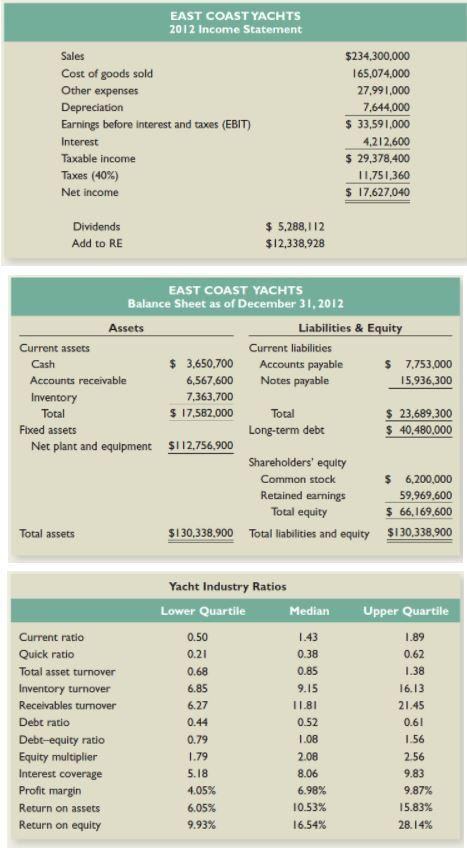Question
Dan Ervin was recently hired by East Coast Yachts to assist the company with its shortterm financial planning and also to evaluate the company's financial
Dan Ervin was recently hired by East Coast Yachts to assist the company with its shortterm financial planning and also to evaluate the company's financial performance. Dan graduated from college five years ago with a finance degree, and he has been employed in the treasury department of a Fortune 500 company since then. East Coast Yachts was founded 10 years ago by Larissa Warren. The company's operations are located near Hilton Head Island, South Carolina, and the company is structured as an LLC. The company has manufactured custom midsize, high-performance yachts for clients over this period, and its products have received high reviews for safety
and reliability. The company's yachts have also recently received the highest award for customer satisfaction. The yachts are primarily purchased by wealthy individuals for pleasure use. Occasionally, a yacht is manufactured for purchase by a company for business purposes. The custom yacht industry is fragmented, with a number of manufacturers. As with any industry, there are market leaders, but the diverse nature of the industry ensures that no manufacturer dominates the market. The competition in the market, as well as the product cost, ensures that attention to detail is a necessity. For instance, East Coast Yachts will spend 80 to 100 hours on hand-buffing the stainless steel stem-iron, which is the metal cap on the yacht's bow that conceivably could collide with a dock or another boat. To get Dan started with his analyses, Larissa has provided the following financial statements. Dan has gathered the industry ratios for the yacht manufacturing industry.

1. Calculate all of the ratios listed in the industry table for East Coast Yachts.
2. Compare the performance of East Coast Yachts to the industry as a whole. For each ratio, comment on why it might be viewed as positive or negative relative to the industry. Suppose you create an inventory ratio calculated as inventory divided by current liabilities. How do you interpret this ratio? How does East Coast Yachts compare to the industry average?
3. Calculate the sustainable growth rate of East Coast Yachts. Calculate external funds needed (EFN) and prepare pro forma income statements and balance sheets assuming growth at precisely this rate. Recalculate the ratios in the previous question. What do you observe?
4. As a practical matter, East Coast Yachts is unlikely to be willing to raise external equity capital, in part because the owners don't want to dilute their existing ownership and control positions. However, East Coast Yachts is planning for a growth rate of 20 percent next year. What are your conclusions and recommendations about the feasibility of East Coast's expansion plans?
5. Most assets can be increased as a percentage of sales. For instance, cash can be increased by any amount. However, fixed assets often must be increased in specific amounts because it is impossible, as a practical matter, to buy part of a new plant or machine. In this case a company has a "staircase" or "lumpy" fixed cost structure. Assume that East Coast Yachts is currently producing at 100 percent of capacity. As a result, to expand production, the company must set up an entirely new line at a cost of $30 million. Calculate the new EFN with this assumption. What does this imply about capacity utilization for East Coast Yachts next year?
EAST COAST YACHTS 2012 Income Statement Sales Cost of goods sold Other expenses Depreciation Earnings before interest and taxes (EBIT) Interest Taxable income Taxes (40%) Net income $234,300,000 165,074,000 27.991.000 7,644,000 $ 33,591.000 4,212,600 $ 29,378,400 11.751,360 $ 17,627.040 Dividends Add to RE $ 5,288,112 $12,338,928 EAST COAST YACHTS Balance Sheet as of December 31, 2012 Assets Liabilities & Equity Current assets Current liabilities Cash $ 3,650,700 Accounts payable $ 7,753,000 Accounts receivable 6,567,600 Notes payable 15,936,300 Inventory 7,363,700 Total $ 17,582,000 Total $ 23,689,300 Fixed assets Long-term debt $ 40,480,000 Net plant and equipment $112.756,900 Shareholders' equity Common stock $ 6,200,000 Retained earnings 59,969,600 Total equity $ 66,169,600 Total assets $130,338.900 Total liabilities and equity $130,338,900 0.21 Current ratio Quick ratio Total asset turnover Inventory turnover Receivables turnover Debt ratio Debt-equity ratio Equity multiplier Interest coverage Profit margin Return on assets Return on equity Yacht Industry Ratios Lower Quartile Median 0.50 1.43 0.38 0.68 0.85 6.85 9.15 6.27 11.81 0.44 0.52 0.79 1.08 1.79 2.08 5.18 8.06 4.05% 6.98% 6.05% 10.53% 9.93% 16.54% Upper Quartile 1.89 0.62 1.38 16.13 21.45 0.61 1.56 2.56 9.83 9.87% 15.83% 28.14%Step by Step Solution
There are 3 Steps involved in it
Step: 1

Get Instant Access to Expert-Tailored Solutions
See step-by-step solutions with expert insights and AI powered tools for academic success
Step: 2

Step: 3

Ace Your Homework with AI
Get the answers you need in no time with our AI-driven, step-by-step assistance
Get Started


